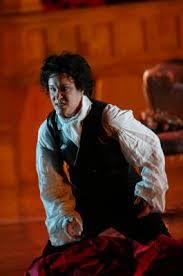The Dome, Brighton, 14 May 2015
Alice Coote is a familiar figure on the opera stage and has been particularly successful in Baroque Opera; a perfectly sound idea then that she should give a concert of familiar Handel arias that suite her voice and dramatic temperament. With one exception the arias chosen were certainly apt and the range of works allowed her to demonstrate her own fine ability for introspective pain and fiery enthusiasm.
What then was the problem at the Dome? Rather than a concert we had a staged event with a programme note drawing our attention to the supposed difficulties of women playing men on stage, an argument brought to light again by the casting for a recent Glyndebourne Rosenkavalier. If the staging by Susannah Waters had gone any way towards addressing the issue it might have made some sense but in the event there seemed to be little relationship between what we were hearing and what we were witnessing. Alice Coote gave us a moving account of He was despised but was sitting, fully dressed, in a bath and poured a jug of water over herself half way through. Why? We also saw a group of painters slowly writing up a large slogan on the back wall. Again it seemed to have nothing to do with the arias sung. It did not help that throughout Alice Coote was dressed in black trousers and a loose black top, giving no indication as to whether the aria she was singing was meant to be for a man or a woman. As such the staging proved a distraction from the emotional and dramatic impact of Handel’s settings.
The evening opened with a fierce Sta nell’ircana from Alcina and after a gently tongue-in-cheek Resign thy club from Hercules the first of three pieces from Ariodante. The role is one of Alice Coote’s finest and she brought real integrity to it – particularly Dopo notte. Theodora’s plaintive Oh that I on wings could rise was heart-breaking, as was the intensity of He was despised.
The only slight miscalculation was Semele’s Myself I shall adore which really needs a lighter voice.
Harry Bicket led the English Concert succinctly from the harpsichord. No sign of an organ on stage which was a pity given that four of the seven works included were written as oratorio and assumed an organ continuo. I am sure anybody simply listening to the evening would have thoroughly enjoyed it. Just a pity that those of us who had to watch had to fight our instincts to sit with our eyes closed.

